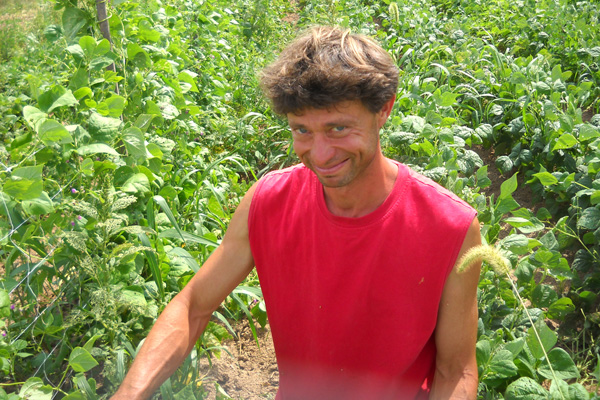-

Erin Donahue -

Christina Barkanic -

Brittany Trott -

Emily Wiley -

Jessica Reilley -

Chris Raines -

Will Nichols -

Emily Reddy -

Michele Marchetti -

Michele Frank -

James Gherardi -

Kit Henshaw -

Christina and Erin -

Kim Tait -

Erin McKinney -

Steve Spanelli -

Sam Komlenic -

Katherine Taylor Grofic -

James Eisenstein -

Jamie Oberdick -

Anna Lombardo -

LacCreta Holland -

Tony Ricci -

Local Food Journey -

Laura Young -

Kristin Camplese -

Harrison's Fresh + Local -

Danielle Matalonis -

Kristine A. -

Linda Weaver -

Naomi Elle Schwartz -

Dana Stuchul -

Cara McShane -

Brittany Smith -

Jessica Illuzzi - Frosty
-

Jessica Paholsky -

James Sechrengost -

Brad Yeckley -

Maya Althouse -

Jordan Reabold -

Kim Chase -

Maria Bryant - Alexandrea Scott
How to Plan a Day’s Work on a Vegetable Farm
Posted by James Eisenstein on 08/04, 2011 at 01:48 PM

Field Commander John Working on Task #9. Photo Credit James Eisenstein.
For those of you who are having trouble falling asleep beset by curiosity over how farmers plan their workdays, this post is for you. Actually, it is a laughably simple two-step process. Step 1: List everything that absolutely must be done. Step 2: Rank the tasks in order of importance and do the work. Ready?
Step 1: Absolutely Essential Midsummer Monday Tasks To Do
1. Seed flats of crops for late summer and fall. No seeding means no fall crops, which means no income and no money to pay the mortgage. Time: 1 hour. (If you didn’t remember to buy seeds, flats, and starting mix, forget it at this point.)
2. Started seedlings flats must be watered thoroughly. In hot weather, remember to check them often; missing just one watering will kill them. This means no fall crops and no money to pay the mortgage. Time: 1.5 hours.
3. The seedlings that were ready to transplant last week are becoming root-bound and spindly. If they’re not transplanted today, you will have less to sell later, which means an unpaid electricity bill. Time: 2 hours.
4. Wait! To transplant seedlings, you need to have already disked, fertilized, roto-tilled, and laid irrigation lines on the growing beds. But you didn’t get to it, so finish these steps before starting task 3. Time: 4 hours.
5. Oops. You can’t spread manure until you remove the ferocious hornets’ nest from the spreader’s wheel well. Soak the nest with water, jack up the spreader, remove the nest, replace the wheel, load the spreader. And make it snappy! Time: 1/2 hour (sure!).
6. Tomatoes sell, but your yield will plummet unless you install stakes immediately, tie them up, and weed them. Time: 2 hours.
7. Peppers sell, too, but weeds are crowding them out. You need to weed! Time: 6 hours.
8. The green beans, summer squash, and okra must be harvested today. Otherwise, you’ll have none to sell or give to harvest share customers. Worse, if not picked regularly, these plants stop producing. Lost revenue means no money to pay the tractor repair bill. Time: 4 hours.
9. Harvest kale, collards, salad mix, lettuce, kohlrabi, beets, currants, onions, and everything else because tomorrow is Boalsburg market day and State College harvest share delivery. Time: 14 hours.
10. Salad mix and arugula need to be washed, bagged, and weighed; lettuce dipped, beets rinsed, garlic cleaned, and other vegetables prepared for market. Time: 4 hours.
11. Oops. Forgot to get more diesel fuel so no field preparation until someone makes a fuel run. Time: 1/2 hour.
12. Carrots and beets are in dire need of thinning and weeding. Put it off even longer and you’ll lose the crop. Time: 3 hours.
13. Pack the harvest share boxes and put them in the cooler. Time: 3 hours.
14. Complete other unlisted essential tasks. Time: 8 hours.
Step 2: Decide the Order in which You will Complete Tasks
Oh, one small detail. These tasks will take over 52 hours, and you have 30 hours of paid and unpaid employee work time, plus your time. So if you work for 22 hours, you can do it all… unless something unexpected happens (which it will).
Welcome to a day in the life of a farmer!
Read more from the Unpaid Field Hand.
![]() Author: James Eisenstein
Author: James Eisenstein
Bio: Unpaid Field Hand at Jade Family Farm | Former Penn State Professor
- Our Local Food Journey comes to an end
- Winter isn’t a quiet time at the farm
- Get the taste of garden season right now by growing herbs indoors
- All you need to know about PASA’s Farming for the Future conference









NO COMMENTS